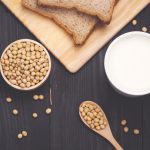The person who suffers from constipation has infrequent stools and/or a difficult evacuation of “bodily waste”. Most of the time, the cause is a prolonged intestinal transit, which means, the digested food moves very slowly along the digestive tract. The body then absorbs all the water contained in the stools which become hard and dry. Constipation may be associated with poor dietary habits, sedentary lifestyle, stress, delayed evacuation of stools, food allergies or intolerances, underlying intestinal disease, etc.1
Reports estimate that as many as 12% to 19% of the North American population is affected by constipation, both children and adults2. Some individuals … more fortunate … suffer from constipation only temporarily, while others, especially the elderly, have to endure the problem chronically3.
A natural approach to better eliminate
- Bet on at least 20 grams, no more than 30 grams of dietary fiber a day. Finding the right amount is essential, too much is like not enough: excess fiber can cause bloating and even obstruction.
-
Choose soluble and insoluble fiber. The first dissolves in water and maintains the hydration of the digestive tract, think of oats, lentils, apples, oranges, nuts, beans, among others, while the second ones are not soluble and increase bulk in stools, whole grains, bran, seeds, vegetables and fruits with peel are all good examples.
- Avoid dehydration by drinking 2 to 3 liters (8 to 10 glasses) of fluids daily, such as water, milk, soup, juice and other nutritious drinks. Tip: tea and coffee help stimulate intestinal contractions and facilitate evacuation. I can already hear you mention the diuretic effect of caffeine, but do not worry, if the hydration is good, everything will “bathe”.
-
Stock up on good fats to lubricate the intestines, such as vegetable oil, good sauces like pesto, nut butters (almond butter and others), avocados and their guacamole, hummus and baba ghanouj, and dips made from oils.
- Eat foods containing probiotics and pre-biotics to soften stools and feed the intestinal bacterial flora. Good options are yogurts, kefir, sauerkraut, kimchi, kombucha, fruits and vegetables in general, whole grain bread.
-
Choose the right probiotic supplement for you. Just like with fiber, too active probiotic cells (over 10 billion) can cause the opposite of the desired effect, and contribute to blocking. Some studies show an increase in stool frequency of at least 20% as a result of a daily probiotic consumption, particularly those containing the Lactobacillus rhamnosus strain (as is the case with the Probaclac products)1.
Did you know
-
Ancient story or current reality? Formerly, it was believed that it was important to pass a stool every day. We now know that it’s completely wrong … Each system is different, as long as we go at least 3 times a week with digestive ease, no need to worry.3
-
Women are 3 times more likely to suffer from constipation than men3. This high incidence can be explained in part by hormonal causes. Children are also frequently constipated, with a “bad” peak around 4 years old1. And let’s not mention what goes on with the elderly…
REFERENCES
1Passeport Santé. [Website]. Consulted January 16th 2018. https://www.passeportsante.net/fr/Maux/Problemes/Fiche.aspx?doc=constipation_pm
2Higgins PDR et Johanson JF. Epidemiology of constipation in North America : a systematic review. Am J Gastroenterol. 2004. 99 : 750-759.
3Fondation Canadienne de la Santé Digestive. [Website]. Consulted January 16th 2018.
http://cdhf.ca/bank/document_fr/5comprendre-la-constipation-.pdf#zoom=100





